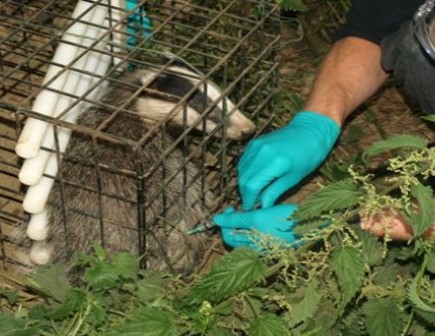Badgers can act as a wildlife reservoir for Mycobacterium bovis (M. bovis), the bacterium which causes TB in cattle. Badger vaccination aims to reduce the spread of the disease in the badger population with the intention of reducing the risk of cattle contracting TB.
Vaccination of badgers against TB using Bacillus Calmette-Guérin (BCG), the same vaccine given to humans, provides a level of protection and can play a role in limiting TB spread to healthy badger populations. Vaccinating badgers with BCG is proven to significantly reduce infection risk and disease spread in healthy badgers. The vaccine reduces the progression and severity of TB in any vaccinated badgers that do become infected, thus reducing the shedding of the bacterium into the environment.
Badger vaccination in England has so far been in small, spatially fragmented areas. Defra is bolstering government vaccinator capability to deploy badger vaccination over ever larger, more contiguous areas. Over time this will help gather more evidence of the direct impact of badger vaccination on reducing TB in cattle herds.
Funding and support for badger vaccination
Defra is increasing government funding for badger vaccination activities, through a range of initiatives. It is currently working with the bovine TB Partnership to jointly explore what other incentives government can put in place to facilitate the wider roll out of badger vaccination. As part of this, from 2022, Defra has applied a new subsidy to the BadgerBCG vaccine. This cuts the cost of the vaccine by almost 50%, making it more accessible to vaccination groups. Defra continues to explore other areas where cost-saving measures can be implemented.
If you’re starting or planning to start a new badger vaccination project, you may be eligible for funding from Defra. Please contact Defra’s bovine TB Programme at badger.vaccination@defra.gov.uk to enquire.
Badger Edge Vaccination Scheme (BEVS 2)
The Badger Edge Vaccination Scheme (BEVS) has provided 50% grant funding to several private groups vaccinating badgers in the Edge Area of England. The scheme runs until February 2023 and is currently closed to new applications.
Vaccinating East Sussex Badgers (VESBA)
In 2021, the government awarded funding for a five-year badger vaccination programme in East Sussex. The scheme, which is coordinated by a local veterinary group, will see badger vaccination deployed by the local farming community across 250 km2 and help refine future delivery models for deploying other large-scale vaccination projects. In its first year, the scheme vaccinated badgers on 30km2 of land. Following significant progress to sign up more farmers and other landowners, the scheme is on track to vaccinate badgers over the majority of the project area by the end of the 2022 open season.
Farmers and other landowners in East Sussex who are interested in joining the scheme or allowing badger vaccination on their land can contact VESBA Project Manager lindsay@hurstanimalhealth.co.uk More information on the scheme can be found on the VESBA website.

Licences to take and mark badgers
Badgers are a protected species, so a licence is required to capture them for vaccination using cage traps and to apply a temporary mark (to show that they have been vaccinated). In May 2022, Defra introduced a new and simplified licence for vaccinating badgers in England. It enables those trained to undertake this activity to register online as an authorised person. This means applicants no longer need to apply for an individual licence, provide extensive information in support of their application and wait up to 30 working days for a decision. The licence and online registration form is available on GOV.UK.
Training to vaccinate badgers
Training must be completed by those cage trapping, vaccinating, and marking badgers. Defra launched a ‘Train the Trainer’ course to enable those with at least one year of practical badger trapping and vaccination experience to qualify to provide training to new vaccinators. This alleviates pressure on the Animal & Plant Health Agency (APHA), who to date have been the sole training provider. Defra has streamlined vaccination training courses to reduce the cost and time commitment, making courses more accessible, meaning more individuals can be trained per season.
For more information on undertaking training to vaccinate badgers see the guidance at GOV.UK. To express your interest and check your eligibility to attend a ‘Train the Trainer’ course, contact Natural England at btbvaccination@naturalengland.org.uk
Planning a badger vaccination project
Delivering a badger vaccination project requires careful planning. You’ll need to apply for a licence to take and mark badgers to enable vaccination. For each person intending to act under the licence, you’ll need to evidence that they have completed the relevant training courses in cage-trapping and vaccinating badgers. Read these practical step by step guides by Dr Andy Robertson on planning a badger vaccination project and the process of badger vaccination.